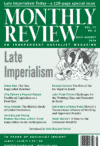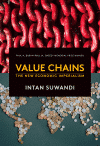2019

The Political Economy of Women's Liberation
Margaret Benston’s “The Political Economy of Women’s Liberation” appears as both a return to the past and, at the same time, if not a “watershed,” as described by Peter Custers, certainly a new turn. On the one hand, she reiterated the classic Marxist-Leninist argument concerning the precapitalist, premarket character of domestic work. On the other, she so strongly insisted on the importance of this work for the stability and perpetuation of the capitalist system that she not only anticipated some of the theses later argued by theorists in the Wages for Housework Campaign, but often fell into apparent contradictions. | more…

Gender is not just about women; it is about the social relationship between men and women and the dialectical, reciprocal, and cultural construction of femininity and masculinity. Recognition of a unique historical experience concerning gender informs the perspectives of African Americans of various political persuasions. This history incorporates a land of origin with certain common principles about gender and family. It also encompasses the African-American experience in the United States where the denial of many “protections” offered by gender roles and indeed sometimes inversion of such roles was a means of maintaining control. Hence asserting the right to assume gender-based roles of husband, father, wife, and mother paradoxically was an act of resistance. The manner in which African-American people have envisioned relationships of gender in light of that history has expressed itself in markedly different forms. | more…

In 1952, Selma James wrote the classic pamphlet A Woman’s Place and, in 1972, she and Mariarosa Dalla Costa published their groundbreaking The Power of Women and the Subversion of the Community, which discussed how women’s unpaid housework and care work is crucial to the production of the working class and, thus, the economy as a whole, launching the domestic labor debate inside the women’s movement. That same year, the International Wages for Housework Campaign was formed. In an interview with Ron Augustin at her home in London, James spoke of her political activities and years with C. L. R. James, whom she was with for more than twenty-five years, each with their own political activities but also sharing important struggles. | more…

Marge Piercy is the author of many books of poetry, most recently Made in Detroit. | more…

This special issue of Monthly Review is meant both to celebrate the fiftieth anniversary of Harry Magdoff’s The Age of Imperialism: The Economics of U.S. Foreign Policy, which was devoted to the analysis of imperialism at the height of U.S. hegemony, and to carry this analysis forward to address the present era of late imperialism in the twenty-first century. In bringing together work on the political economy of imperialism in the current era of globalized production, we seek to transcend the now fashionable view within the Western academic left that the concept of imperialism is obsolete. The imperialist world system stands not only for capitalism at its most concrete historical level, but also for the entire dynamic structure of power constituting accumulation on a world scale, which can only be understood in terms of a developing global rift between center and periphery, global North and global South. Failure to attend to this fissure would be fatal for humanity. | more…

Fifty Years After Harry Magdoff's The Age of Imperialism
The globalization of production (and finance)—which emerged along with neoliberalism out of the economic stagnation of the mid–1970s and then accelerated with the demise of Soviet-type societies and China’s reintegration into the capitalist world system—has generated a more generalized monopoly capitalism, ushering in what can be called late imperialism. Late imperialism refers to the present period of monopoly-finance capital and stagnation, declining U.S. hegemony and rising world conflict, accompanied by growing threats to the ecological bases of civilization and life itself. It stands at its core for the extreme, hierarchical relations governing the capitalist world economy in the twenty-first century, which is increasingly dominated by mega-multinational corporations and a handful of states at the center of the world system. Just as it is now common to refer to late capitalism in recognition of the end times brought on by simultaneous economic and ecological dislocations, so it is necessary today to speak of late imperialism, reflecting the global dimensions and contradictions of that system, cutting across all other divisions, and posing a “global rift” in human historical development: an epochal crisis posing the question of “ruin or revolution.” | more…

Today, we not only have decades of neoliberalism behind us, but the neoliberal regime itself has reached a dead end. Contemporary imperialism has to be discussed within this setting. There are two main reasons why the regime of neoliberal globalization has run into a dead end. The first is an ex ante tendency toward global overproduction; the second is that the only possible counter to this tendency within the regime is the formation of asset-price bubbles, which cannot be conjured up at will and whose collapse, if they do appear, plunges the economy back into a crisis. In short, there are no “markets on tap,” to use the words of British economic historian Samuel Berrick Saul, for contemporary metropolitan capitalism, such as had been provided by colonialism prior to the First World War and by state expenditure in the post-Second World War period of dirigisme. | more…

We have reached a level of centralization in capital’s power of domination, such that the bourgeoisie’s forms of existence and organization as known up to now have been completely transformed. Contemporary capitalism has become a capitalism of generalized monopolies. Monopolies no longer form islands in an ocean of corporations that are not monopolies—and consequently are relatively autonomous—but an integrated system, and consequently now tightly control all productive systems. Small and medium-sized companies, and even large ones that are not themselves formally owned by the oligopolies, are enclosed in networks of control established by the monopolies upstream and downstream. Consequently, their margin of autonomy has shrunk considerably. These production units have become subcontractors for the monopolies. This system of generalized monopolies is the result of a new stage in the centralization of capital in the countries of the triad that developed in the 1980s and ’90s. | more…

The Hidden Abode of Global Production
The analysis of global commodity chains creates some crucial questions in relation to the nature of imperialism in the twenty-first century: (1) whether decentralized global commodity chains can be seen as constituting a decentralization of power among the major actors within these chains, and (2) whether the complexities of these chains suggest that the hierarchical, imperialist characteristics of the world economy have been superseded. I argue that the answer to both of these questions is no. Despite the seemingly decentralized networks, and notwithstanding the existing complexities that characterize global commodity chains, the capital-labor relations inherent in these chains are still imperialistic in their configurations. | more…

Today there can be no doubt about the main force behind our ongoing planetary emergency: the exponential growth of the capitalist world economy, particularly in the decades since the mid–twentieth century. The mere critique of capitalism as an abstract economic system, however, is insufficient in addressing today’s environmental problems. Rather, it is necessary also to examine the structure of accumulation on a world scale, coupled with the division of the world into competing nation-states. Our planetary problems cannot realistically be addressed without tackling the imperialist world system, or globalized capitalism, organized on the basis of classes and nation-states, and divided into center and periphery. Today, this necessarily raises the question of imperialism in the Anthropocene. | more…

During the 2018 Brazilian presidential elections, almost thirty years after the first democratic elections since the military dictatorship, Jair Bolsonaro took on the role of supposed underdog and, in the face of the collapse of the other center and right-wing bourgeois candidates, became the only one capable of countering the risk of the victory of the Workers’ Party. Bolsonaro, or the captain, as he is frequently called by his acolytes, is a sort of Donald Trump of the periphery—a second-rate Trump. Though he appears to be the most radical critic of the system, he is, in fact, the very image of the status quo, in all its brutality and rawness. | more…

In Brazil, there have been two recent parliamentary coups against the Workers’ Party and in favor of banks and corporations. Dilma Rousseff was impeached in 2016 and Luiz Inácio Lula da Silva was prevented from running for president, sequestered, and imprisoned. The electoral coups have resulted in a government without a social base in most of Brazilian society. It does not have a project for the majority or for the nation. It is just a project for international capital, dominated by banks and global corporations. This has led to a government made up of many nuclei of power that, despite internal contradictions, remain in agreement as a unit with regard to the project of capital. | more…

This reprise of Harry Magdoff’s 1969 “A Note on the Communist Manifesto” remains as relevant as ever—perhaps even more so. While capitalism by its very nature lives by accumulation and geographic expansion, it does so in a most unequal fashion. Even though nothing in economics follows strict mathematical rules, there are notable tendencies produced by the inner springs of capitalism. An outstanding example of such a tendency is found in the distinct and marked widening of the gap between a handful of rich nations and the rest of the world. The accelerating globalization of our times demonstrates this polarization in no uncertain terms. | more…












